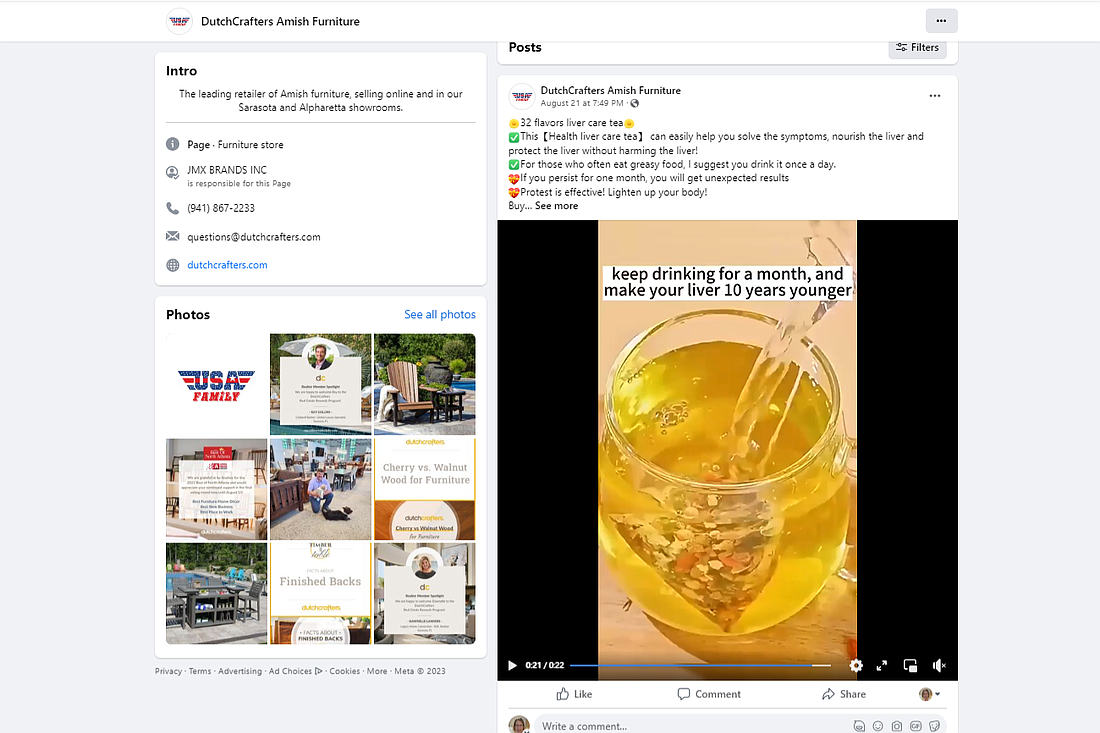- December 13, 2025
-
-
Loading

Loading

A local furniture company is reeling in losses after a recent Facebook hack.
On July 18, a social media specialist at DutchCrafters attempted to sign into her personal account only to realize she no longer had access. Debra Gingerich, director of marketing, got on to make sure everything was good with the business page and that’s when she found out — all of the admins had been kicked out from both DutchCrafters and its sister brand, Eco-Friendly Digs. DutchCrafters, a retailer of Amish furniture and home décor in Sarasota, is the daughter company of JMX Brands.
Facebook, which now operates as Meta, has a help center that features an entire section for hacked and fake accounts. At the top of the page it reads, “Your account should represent you, and only you should have access to your account. If someone gains access to your account, or creates an account to pretend to be you or someone else, we want to help.”
But that help, as DutchCrafters can attest, is not easy or quick.
Through the social media specialist’s personal page, the hacker gained access more than a month ago to the DutchCrafters business page.
Prior to being hacked, the company had used Facebook for advertising.
“We've seen a very clear correlation between revenue in our stores and Facebook advertising,” she says, noting there’s been a 16% drop in revenue compared to last year during this time. “Certainly not what we want to see, especially since we had been seeing increases in the Sarasota store.”
DutchCrafters is primarily an online business that sells Amish-made furniture, but there are two showrooms in Sarasota and Alpharetta, Georgia. The walk-in traffic for the Sarasota location alone has also dropped, albeit more significantly, by 65% year over year.
“Foot traffic is also an indication of what’s to come for us because we sell a very specialized product,” Gingerich says. “It’s not unusual for someone to come in, spend some time with a furniture specialist, leave, think it over and return. It’s usually a sign of future sales being down.”
According to the Identity Theft Resource Center, social media account takeovers had jumped up 1,044% in 2021 over 2020.
Another impact has been the loss of followers. DutchCrafters, which is the primary brand of parent company JMX, had garnered 41,000 followers on Facebook.
Although Gingerich is still hopeful to regain control of the Facebook page, she set up a new business page in the meantime to get advertising going again.
“We don’t want to lose access to the audience we’ve built on Facebook,” she says, adding, “If we never get this resolved, that will become our new business page.” So far, that page, created on Aug. 9, has gained only 13 followers.
The process of setting up a new account took some time. As soon as she associated the ad account to the page, Facebook noted unusual activity and shut down that page. They’re currently operating with the third business page she’s attempted to set up.
Gingerich is still worried about the impact the hacked page will have with customers. One customer reached out with a question regarding a bird feeder they had purchased from DutchCrafters. But without access to the page, Gingerich says they’ve been unable to respond.

Since it was hacked, there’s been an ad posted for a liver care tea and the profile picture has been changed. “(The hacker is) affecting our reputation by appearing to be us and putting up ads that are inappropriate to our brand,” she says.
Even more disturbing is Facebook’s lack of response.
Gingerich began researching ways to contact Facebook on July 18 only to find it’s not that easy. She found a few email addresses that never responded and then submitted a claim through the social media giant’s help system.
“There’s still no resolution on that,” she says. “There’s been a lot of back and forth. I will check in (and) they’ll send a generic response that they’re working on it.”
This continued for weeks, she says, until Facebook’s response changed. “I got a message from them that due to no correspondence, they were going to close the claim,” she says, noting she immediately sent proof. But now she’s back to receiving generic responses. An email to a Meta spokesperson, Meta being the parent company, for comment was not returned.
Gingerich says she’s provided screenshots of ads that have been posted by the hacker and since she still has limited access to the page was able to submit the email address of the person who took over. She’s also filed a report with the Federal Trade Commission, which doesn’t resolve individual reports but instead files those reports into a database available for federal, state and local law enforcement.
The next step Gingerich is considering is reaching out to the Federal Bureau Investigation.
“At first I didn't even think about those options because I just imagined we provided all of the evidence that Facebook claimed it needed so it would get resolved,” Gingerich says of the decision to include the federal organizations in the situation. “But as I’ve read more, a lot of these just don’t get resolved.”
If nothing else, the experience taught Gingerich how to deal with this going forward.
Gingerich says it’s important for admins of business pages to have a two-step authentication set up on their personal account.
It doesn’t ensure that a hacker isn’t going to figure a way through, she says, but it helps.
Other advice: If hacked, set up what you need to for the business to continue flowing.
"I would say for people whose advertising is significant for them and their business I would suggest they set up another business page and start trying to advertise immediately (instead of) just hoping that Facebook will resolve the matter."
In the beginning, Gingerich thought she provided all of the necessary proof. Once she had set up a claim, she received a response that she would hear from someone at Facebook in 48 hours. She remembers thinking, ‘This isn’t going to take long.’
“A month later,” she says, “we’re still here.”